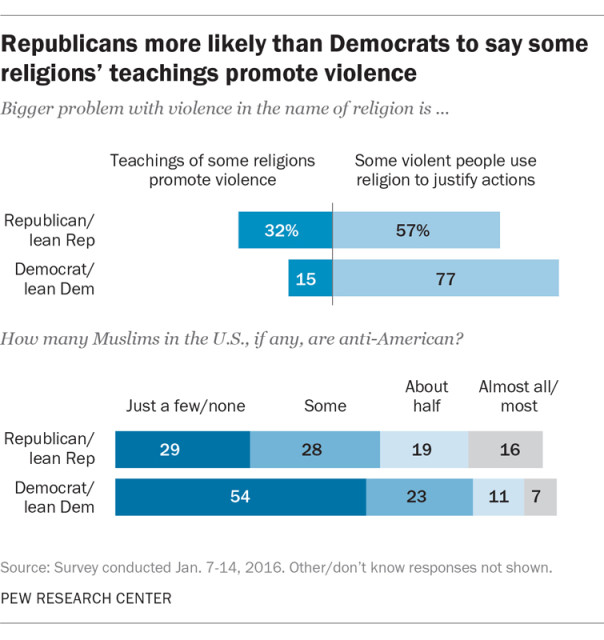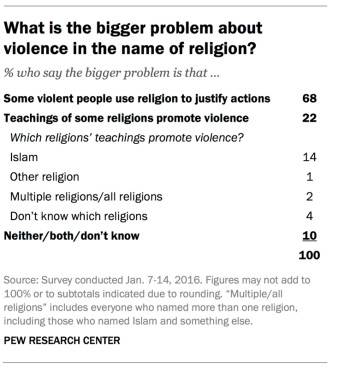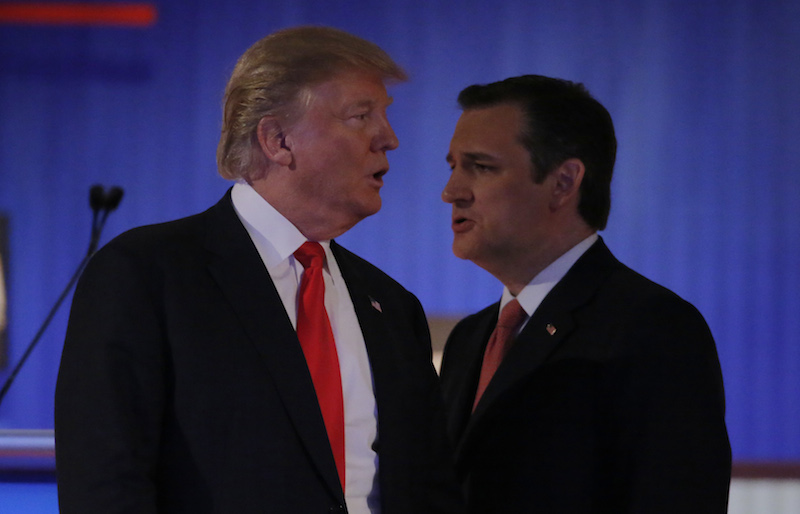
Republicans more likely than Democrats to say some religions’ teachings promote violence. Graphic courtesy of Pew Research Center
(RNS) Republicans and Democrats divide sharply over views on Islam, Muslims and how a U.S. president should label violent extremists.
But Americans overall agree there’s “a lot” of discrimination against Muslims living in the United States — and it’s rising — a new Pew Research survey finds.
RELATED STORY: Obama pleads for tolerance in first visit to US mosque
The survey, of 2,009 U.S. adults, was conducted in January, a month after 14 people were killed in a San Bernardino, Calif., terrorism attack and Republican presidential candidate Donald Trump called for banning Muslims’ entry to the United States.
“I’m struck by the finding that 25 percent of the public thinks at least half the Muslims in the U.S. are anti-American,” said Besheer Mohamed, a senior researcher at Pew and a co-author of the survey analysis, released Wednesday (Feb. 3).
The overall finding was the same for this question when it was asked in 2002, a year after the 9/11 terrorist attack.
What’s new, said Mohamed, is the partisan split in 2016 that was not evident in 2002.
RELATED STORY: Muslim Americans involved in terrorism ‘rose dramatically’ in 2015
Among Democrats and those who lean Democratic, 54 percent say “just a few or no” Muslims here are anti-American. Thirty-four percent say this is so for about half or some Muslims in the U.S., and 7 percent say it’s true for almost all Muslims living here.
But for Republicans and those who lean toward the GOP, 29 percent say that few or no Muslims are anti-American. Forty-seven percent say this is so for half or some, and 16 percent say almost all of them harbor anti-American views.
It’s hard to know the reason behind the partisan realignment since 2002. But, Mohamed said, there are clues in responses to the survey question on how the public wants the next president to talk about “Islamic extremists” (the phrase Pew used in its questionnaire).
RELATED STORY: Muslim Americans fear demonization of Islam after mass shooting
“We see a sharp partisan split on this,” he said.
Overall, 50 percent of U.S. adults say the next president should “be careful not to criticize Islam as a whole when speaking about Islamic extremists,” while 40 percent say the next president should “speak bluntly about Islamic extremists even if the statements are critical of Islam as a whole.”
Democrats and Republicans are almost mirror opposites on this.
“For Republicans, 65 percent want a blunt-talking president, even if that means the president is critical of Islam. Whereas, for Democrats, 70 percent say the next president should be careful not to criticize Islam as a whole,” said Mohamed.
Among Republican voters, most who favor blunt talk say Trump or his chief rival, Texas Sen. Cruz, would make “good” or “great” presidents.
RELATED STORY: What do the Iowa caucus winners believe? Check RNS’ ‘5 Faith Facts’ series

What is the bigger problem about violence in the name of religion? Graphic courtesy of Pew Research Center
According to the report, “Republicans are twice as likely as Democrats to say the main problem with violence committed in the name of religion is that some religions espouse violent teachings (though this is the minority view within both parties at 32 percent and 15 percent respectively).”
That finding echoes a December 2015 survey that found 46 percent of Americans think Islam is more likely than other religions to encourage violence.
In the latest survey, Pew finds that most Americans say religion doesn’t cause violence, but rather violent people use religion to justify their actions. More than 2 in 3 (68 percent) say some violent people use religion to justify their actions. But 22 percent say the teachings of some religions promote violence, including 14 percent who point the finger at Islam.
Partisanship also shows up on whether Muslims living in the U.S. face “a lot” of discrimination: 74 percent of Democrats but only 42 percent of Republicans say this is so.
Even so, the parties unite on one point: 76 percent, including majorities in both parties, say “discrimination against Muslims is on the rise.”
(Cathy Lynn Grossman is senior national correspondent at RNS)





